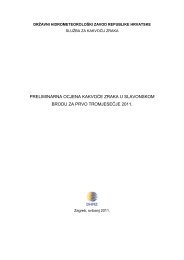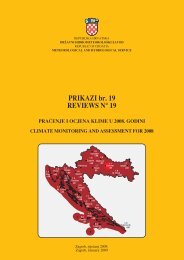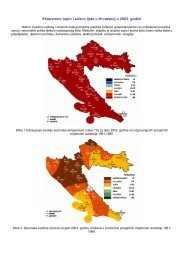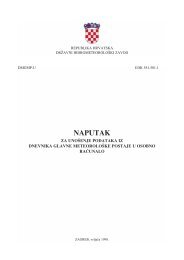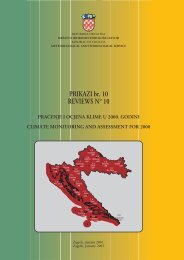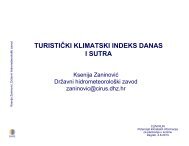CROATIAN CLIMATE OBSERVING SYSTEM
CROATIAN CLIMATE OBSERVING SYSTEM
CROATIAN CLIMATE OBSERVING SYSTEM
Create successful ePaper yourself
Turn your PDF publications into a flip-book with our unique Google optimized e-Paper software.
<strong>CROATIAN</strong> <strong>CLIMATE</strong> <strong>OBSERVING</strong> <strong>SYSTEM</strong> 7<br />
1. Introduction<br />
Under the contract ruling the execution of the UNDP/GEF project<br />
CRO/03/G31/A/1G/99, Expedited Financing of Climate Change Enabling Activity -<br />
Phase II, signed by the Ministry of Environmental Protection, Physical Planning and<br />
Construction, Ulica Republike Austrije 20, 10000 Zagreb, and the National Meteorological<br />
and Hydrological Service, GriË 3, 10000 Zagreb, the Executor has agreed to carry out<br />
research and prepare a study on the Croatian climate observing system in accordance<br />
with the project document and the UNDP National Execution Guidelines.<br />
The contract was signed and delivered to the Executor in early February 2005.<br />
All available documents on observation networks and all available GCOS documents,<br />
together with consultations with experts from different institutions responsible for different<br />
climate system domain observations and measurements (atmospheric, oceanic, terrestrial<br />
domains and satellite measurements) have been used to complete the project.<br />
This is an initial analysis which will help to further identify all the subjects involved in<br />
observation activities and all data users with a view to co-ordinating all existing observing<br />
systems in Croatia. It will also be a starting point in the execution of regional and international<br />
projects. This study has been prepared by Zvonimir Katuπin, National<br />
Meteorological and Hydrological Service.<br />
2. Global Climate Observing System<br />
2.1 Global Climate Observing System - purpose and tasks<br />
The Global Climate Observing System comprises observations of all climate system<br />
components (atmosphere, oceans/seas, land), and its objective is to define and encompass<br />
all the needs for observations in the climate system, including space-based (satellite)<br />
observations of all climate system variables, at world, regional and national level, and to<br />
establish the conditions for observation improvements.<br />
The goals stated in the Second Report on the Adequacy of the Global Observing Systems<br />
for Climate are to:<br />
• determine what progress has been made in implementing climate observing networks<br />
and systems since the First Adequacy Report in 1998;<br />
• determine the degree to which these networks meet with scientific requirements and<br />
conform with associated observing principles; and<br />
• assess how well existing systems, together with new and emerging methods of observation,<br />
will meet the needs of UNFCC.<br />
The GCOS Steering Committee recommended the following action plan:<br />
Intergovernmental agencies, GCOS, GOOS, GTOS, need to develop guidelines, standards<br />
and rules for performing terrestrial observations which do not exist at this level. For<br />
atmospheric (WMO) and oceanic (GOOS) observations, all these regulations exist. All<br />
countries need to maintain continuous observations and data exchange at the level of<br />
essential climate variables.<br />
ATMOSPHERIC VARIABLES (above land, sea and ice)



